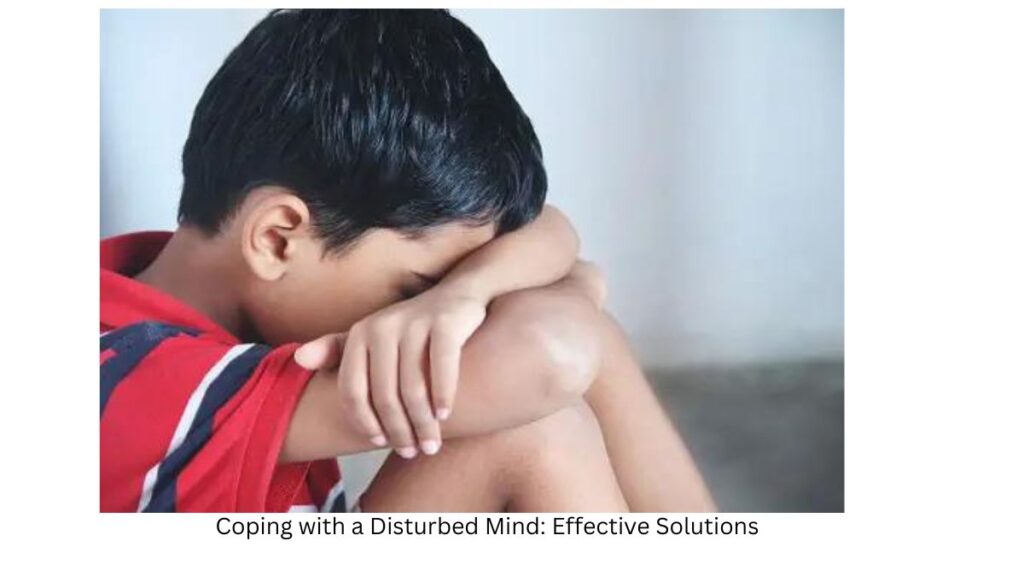Introduction: –
Coping with a Disturbed Mind: Effective Solutions

In our fast-paced and demanding world, it’s not uncommon for our minds to become disturbed and overwhelmed. Whether it’s due to stress, anxiety, or life’s challenges, finding effective solutions to cope with a troubled mind is essential for maintaining mental well-being. In this article, we’ll explore some practical and proven techniques to help you regain peace and clarity when your mind is disturbed.
Understanding a Disturbed Mind
Before we dive into the solutions, it’s crucial to understand what a disturbed mind can feel like. When your mind is disturbed, you might experience symptoms such as racing thoughts, restlessness, irritability, difficulty concentrating, and an overall sense of unease. These symptoms can significantly impact your daily life and overall happiness.

1. Mindfulness Meditation
One of the most powerful tools for coping with a disturbed mind is mindfulness meditation. This practice involves paying attention to the present moment without judgment. It can help you become more aware of your thoughts and feelings, allowing you to detach from them and find a sense of calm.
To get started with mindfulness meditation, find a quiet and comfortable space. Close your eyes and focus on your breath. Breathe in slowly and deeply, then exhale in the same manner. When your mind starts to wander, gently bring your focus back to your breath. Over time, this practice can help you manage racing thoughts and reduce mental disturbances.
2. Physical Activity
Exercise is not only beneficial for your physical health but can also work wonders for your mental well-being. Engaging in regular physical activity releases endorphins, which are natural mood lifters. Whether it’s going for a run, practicing yoga, or simply taking a walk in nature, physical activity can help clear your mind and reduce stress.
3. Journaling
Expressing your thoughts and emotions through writing can be a therapeutic way to cope with a disturbed mind. Keeping a journal allows you to process your feelings and gain insights into the root causes of your mental disturbances. Try to write freely without judgment or self-criticism. This can be a valuable tool for self-reflection and self-discovery.
4. Seek Professional Help
If your mental disturbances are severe or persistent, don’t hesitate to seek professional help. A mental health professional, such as a therapist or counselor, can provide you with guidance and support. They can help you develop coping strategies tailored to your specific needs and circumstances. Sometimes, a trained expert is the most effective solution.
5. Deep Breathing Exercises
Deep breathing exercises can be a quick and effective way to calm a disturbed mind. You can practice deep breathing by inhaling deeply through your nose, holding your breath for a few seconds, and then exhaling slowly through your mouth. This technique activates your body’s relaxation response, reducing stress and anxiety.
6. Limit Exposure to Stressors
Identify the sources of stress in your life and take steps to limit your exposure to them. This might involve setting boundaries, saying no to additional commitments, or removing yourself from stressful situations when possible. Reducing stressors in your life can go a long way in preventing mental disturbances.
7. Connect with Supportive People
Having a strong support system is crucial for coping with a disturbed mind. Share your feelings and concerns with friends and family members who are understanding and empathetic. Sometimes, simply talking about your troubles can provide relief and comfort.
8. Practice Self-Compassion
It’s essential to treat yourself with kindness and understanding during moments of mental disturbance. Be gentle with yourself and avoid self-criticism. Understand that it’s okay to have moments of distress, and it doesn’t define your worth. Practicing self-compassion can help you navigate through challenging times more effectively.
9. Relaxation Techniques
Incorporate relaxation techniques into your daily routine. This could involve activities such as progressive muscle relaxation, guided imagery, or taking a warm bath. These techniques promote relaxation and help ease the tension that often accompanies a disturbed mind.
10. Gratitude Practice
Focusing on gratitude can shift your perspective and improve your mental state. Each day, take a moment to reflect on the things you’re grateful for. This simple practice can help you find positivity even in challenging times and reduce mental disturbances.
How do people with mentally disturbed behave?
People with mental disturbances can exhibit a wide range of behaviors and symptoms, depending on the specific mental health condition they are experiencing. It’s important to note that each person’s experience is unique, and not all individuals with mental health issues will exhibit the same behaviors. Mental health disorders encompass a broad spectrum of conditions, including anxiety disorders, mood disorders, psychotic disorders, personality disorders, and more. Here are some common behaviors and symptoms that individuals with mental disturbances may exhibit:

- Changes in Mood: People with mental health issues may experience dramatic shifts in mood. This can manifest as excessive sadness, irritability, anger, or elation. For example, individuals with depression may appear consistently sad and withdrawn.
- Social Withdrawal: Some individuals with mental disturbances may withdraw from social activities, isolate themselves from friends and family, and avoid social interactions. They may feel overwhelmed by social situations or fear judgment and rejection.
- Irritability and Agitation: Increased irritability and agitation can be symptoms of various mental health conditions. People may become easily angered or agitated, often reacting with outbursts or intense frustration.
- Difficulty Concentrating: Mental health issues can affect cognitive functioning, making it challenging for individuals to concentrate and make decisions. They may struggle to focus on tasks or complete them effectively.
- Changes in Sleep Patterns: Insomnia or excessive sleep can be associated with mental disturbances. Some individuals may have difficulty falling asleep or staying asleep, while others may oversleep.
- Changes in Appetite and Weight: Mental health conditions can influence eating habits. Some people may experience a loss of appetite and weight loss, while others may turn to overeating and gain weight as a way of coping.
- Self-Harm or Suicidal Ideation: In severe cases, individuals with certain mental health disorders, such as depression or borderline personality disorder, may engage in self-harming behaviors or have thoughts of suicide. These are critical signs that immediate help is needed.
- Substance Abuse: Some people may turn to drugs or alcohol as a way to self-medicate and cope with their mental health issues, which can lead to substance abuse problems.
- Hallucinations and Delusions: In conditions like schizophrenia, individuals may experience hallucinations (perceiving things that are not real) and delusions (strongly held false beliefs). These can result in unusual or bizarre behaviors.
- Repetitive Compulsions or Obsessions: Obsessive-compulsive disorder (OCD) can lead to behaviors like excessive handwashing, checking, or counting. These behaviors are often performed as a response to obsessive thoughts.
- Paranoia: Some individuals may become paranoid, believing that others are out to harm them or that they are being watched or followed.
- Difficulty in Communication: Certain mental health disorders, such as social anxiety disorder, can make it difficult for individuals to engage in conversation or maintain eye contact.
It’s important to remember that the severity and presentation of these behaviors can vary widely. Additionally, some individuals may experience more than one mental health condition simultaneously, further complicating their behavior and symptoms.
How do you help a mentally disturbed person?
Supporting a mentally disturbed person is a crucial and sensitive task. It requires understanding, empathy, and a willingness to provide assistance. Here are some steps you can take to help someone who is experiencing mental health issues:
- Educate Yourself: Start by educating yourself about the person’s specific mental health condition, if known. Understanding the symptoms, triggers, and treatment options associated with their condition will help you provide better support.
- Listen Actively: One of the most important things you can do is listen. Allow the person to express their feelings and thoughts without judgment. Be patient and avoid interrupting or offering immediate solutions.
- Show Empathy and Compassion: Let the person know that you care and that you are there to support them. Acknowledge their feelings and struggles with compassion. Avoid making dismissive or judgmental comments.
- Offer Your Presence: Sometimes, just being present can make a significant difference. Spend time with the person, engage in activities they enjoy, or simply be there to lend a listening ear when they need it.
- Encourage Professional Help: Gently suggest that they seek professional help, such as a therapist, counselor, or psychiatrist. Offer to help them find a mental health provider or accompany them to appointments if they’re comfortable with that.
- Respect Their Boundaries: While it’s essential to offer support, it’s equally important to respect their boundaries. Understand that they might need space at times, and it’s okay to let them have it.
- Avoid Stigmatizing Language: Be mindful of the language you use. Avoid stigmatizing terms or phrases that may make the person feel ashamed or judged for their condition.
- Encourage Self-Care: Help the person develop healthy self-care routines, such as getting enough sleep, eating well, and engaging in physical activity. These practices can contribute to improved mental health.
- Provide Practical Help: Offer assistance with daily tasks or responsibilities, such as cooking, cleaning, or running errands, if the person is comfortable with it. Mental health conditions can sometimes make it challenging to manage everyday activities.
- Stay in Touch: Keep in regular contact with the person, even if it’s just a text message or a quick call to check in. Knowing that someone cares can be a source of comfort.
- Foster a Supportive Environment: Create a supportive and nonjudgmental environment for the person. Encourage them to express their feelings and thoughts without fear of criticism.
- Be Patient: Recovery from mental health issues can be a gradual process, and there may be setbacks. Be patient and understanding, and avoid putting pressure on the person to “get better” quickly.
- Recognize Signs of Crisis: Learn to recognize signs of a mental health crisis, such as self-harm, suicidal thoughts, or extreme agitation. In such situations, seek immediate professional help or contact a crisis helpline.
- Involve Trusted Family and Friends: If the person is comfortable with it, involve their close friends and family members in providing support. A strong support network can be beneficial.
- Seek Support for Yourself: Providing support to someone with mental health issues can be emotionally draining. Don’t hesitate to seek your support through counseling, support groups, or talking to a mental health professional about your own feelings and concerns.
Remember that you are not a replacement for professional mental health treatment, and it’s crucial to encourage the person to seek expert help. If the individual is in immediate danger or experiencing severe distress, don’t hesitate to contact emergency services or a crisis hotline for assistance.
In conclusion,
coping with a disturbed mind is a common challenge in our fast-paced world, but there are effective solutions available. By incorporating mindfulness meditation, physical activity, journaling, professional help, deep breathing exercises, stress reduction, social support, self-compassion, relaxation techniques, and a gratitude practice into your life, you can regain a sense of peace and clarity. Remember that it’s okay to seek help when needed, and prioritize your mental well-being. By implementing these strategies, you can better cope with a disturbed mind and move towards a happier, healthier life.





